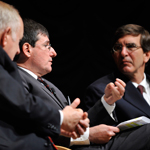Registration
You will receive an email confirming your registration.
 This session explores key questions arising from the Congressional Commission on the Strategic Posture of the United States and the new Carnegie book, Abolishing Nuclear Weapons: A Debate. Does emphasizing the deterrent value of nuclear weapons help prevent proliferation or encourage it? If the nuclear-armed states were serious about disarmament, would proliferation stop? Does exploring abolition help renovate the nuclear order or break it? Would safer, more secure and reliable nuclear warheads facilitate nuclear disarmament and security or undermine them? If the U.S. and Russia agreed to reduce to 500 nuclear weapons, would China, India and others reduce accordingly or build up to seek parity with them?
This session explores key questions arising from the Congressional Commission on the Strategic Posture of the United States and the new Carnegie book, Abolishing Nuclear Weapons: A Debate. Does emphasizing the deterrent value of nuclear weapons help prevent proliferation or encourage it? If the nuclear-armed states were serious about disarmament, would proliferation stop? Does exploring abolition help renovate the nuclear order or break it? Would safer, more secure and reliable nuclear warheads facilitate nuclear disarmament and security or undermine them? If the U.S. and Russia agreed to reduce to 500 nuclear weapons, would China, India and others reduce accordingly or build up to seek parity with them?
